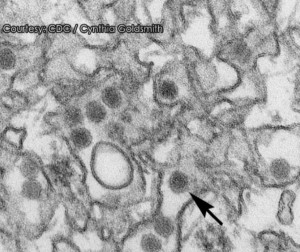 The CDC is now able to test for Zika virus and is making this testing available through state health departments. Individuals who are pregnant and have traveled to an area with Zika transmission should talk to their healthcare provider about testing. Non-pregnant travelers with Zika symptoms are also be eligible for testing and may discuss this option with their healthcare provider.
The CDC is now able to test for Zika virus and is making this testing available through state health departments. Individuals who are pregnant and have traveled to an area with Zika transmission should talk to their healthcare provider about testing. Non-pregnant travelers with Zika symptoms are also be eligible for testing and may discuss this option with their healthcare provider.
Zika virus is not particularly new. In fact, it was first identified in the Zika Forest of Uganda in 1947 and outbreaks have since occurred in parts of Africa, Southeast Asia, the Pacific Islands and more recently, parts of South and Central America, the Caribbean and Puerto Rico. Since the type of mosquitoes that are able to carry and spread the virus can be found in many parts of the world, including the U.S, it is likely that outbreaks will continue to occur. Zika is not currently circulating in the United States; however, cases of Zika have been reported in travelers returning from affected regions.
Common symptoms of Zika are fever, rash, joint pain, or red eyes (conjunctivitis). Only about 1 in 5 people infected with Zika will actually become ill and for most people, this illness will be mild with symptoms lasting less than a week. There is currently no vaccine to prevent or medicine to treat Zika. Treatment is generally rest and symptomatic care.
If Zika is usually a mild illness, why be concerned? As noted by Dr. Frankovich, Medical Director for Western U.P. Health Department, “Concerns primarily center around reports of congenital microcephaly (small head) and underdeveloped brains in babies of mothers who were infected with Zika virus while pregnant.” She adds that “It is not yet known whether Zika is causing these birth defects. Scientists are working hard to understand whether Zika is the culprit.” In fact, the Centers for Disease Control (CDC) has just dispatched a team of researchers to Brazil to conduct studies focused on this question.
In the meantime, the CDC recommends that pregnant women consider postponing travel to areas where Zika transmission is ongoing. Women who are pregnant or trying to become pregnant and are planning to travel to an affected region, are advised to talk with their healthcare provider first and follow steps to avoid mosquito bites. Mosquitoes that spread Zika bite mostly during the daytime; therefore, it is important to ensure protection from mosquitoes throughout the entire day. Because Zika is capable of being transmitted sexually, partners of women who are pregnant and reside in or have traveled to areas with Zika transmission should use condoms or abstain from sex throughout the pregnancy.
When it comes to prevention, Dr. Frankovich says, “In the U.S., mosquito populations are not currently carrying the virus, so no special avoidance measures need to be taken. However, U.S. residents travelling to areas with Zika should take steps to avoid mosquito bites as recommended by the CDC.” These include:
- Use insect repellents. Repellents containing DEET, picaridin, IR3535, and some oil of lemon eucalyptus and para-menthane-diol products provide long lasting protection. When used as directed on the product label, insect repellents containing DEET, picaridin, and IR3535 are safe for pregnant women.
- Use air conditioning or window/door screens to keep mosquitoes outside. If you are not able to protect yourself from mosquitoes inside your home or hotel, sleep under a mosquito net.
- Wear long-sleeved shirts and long pants or permethrin-treated clothing.
- If both sunscreen and insect repellent are used, apply the sunscreen first and then the repellent.
- Help reduce the number of mosquitoes inside and outside your home or hotel room by emptying, turning over, covering, or throw out yard items that hold water (ex. tires, buckets, planters, toys, or trash containers).
Prevention is important, particularly for pregnant women but Dr. Frankovich emphasizes, “Nearly everyone who becomes infected with ZIka will recover quickly and without complications. It is very different from Ebola, for instance, which caused devastating illness and thousands of deaths in recent years. The biggest focus right now is on understanding how Zika may affect pregnancy.”
Information and guidance regarding Zika virus is being updated frequently. Please go to the Centers for Disease Control for the most current recommendations at http://www.cdc.gov/zika
Western U.P. Health Department is the regional public health agency serving Houghton, Keweenaw, Baraga, Ontonagon, and Gogebic counties with environmental, personal and community health services. Western U.P Health Department has offices in Hancock, L’Anse, Ontonagon and Bessemer.
 Keweenaw Report Your Source for Local News and Sports
Keweenaw Report Your Source for Local News and Sports





